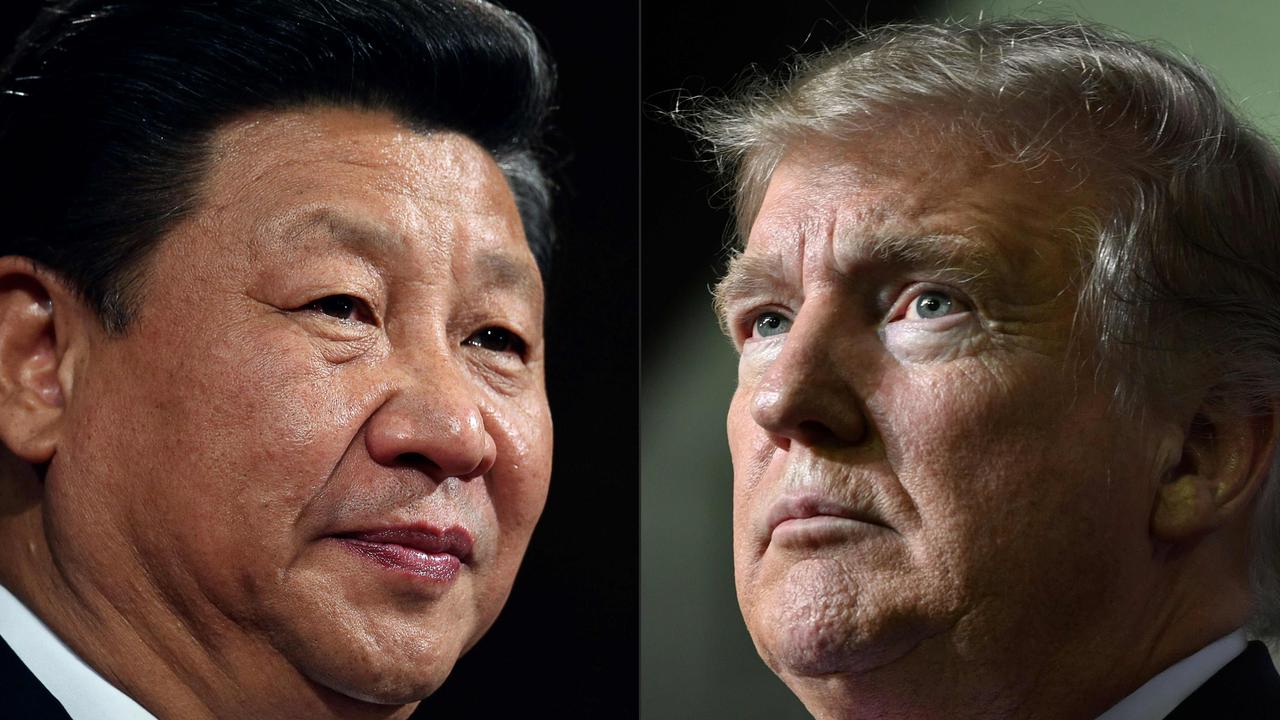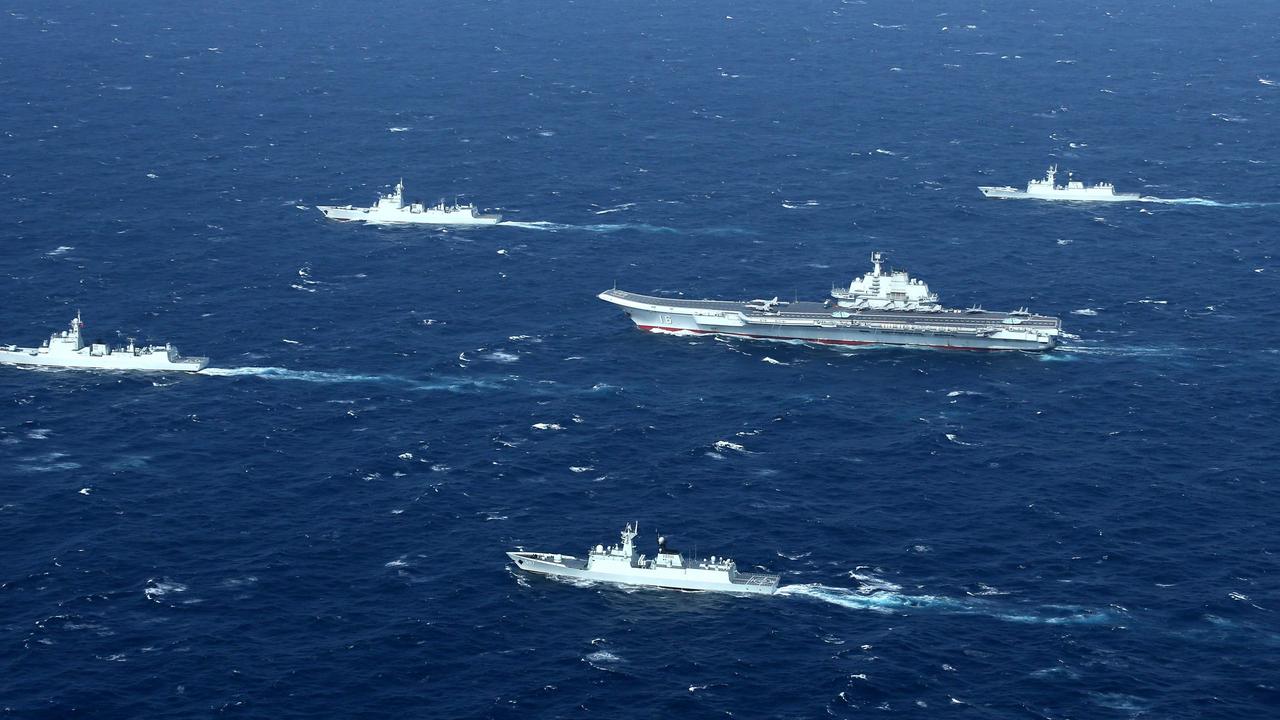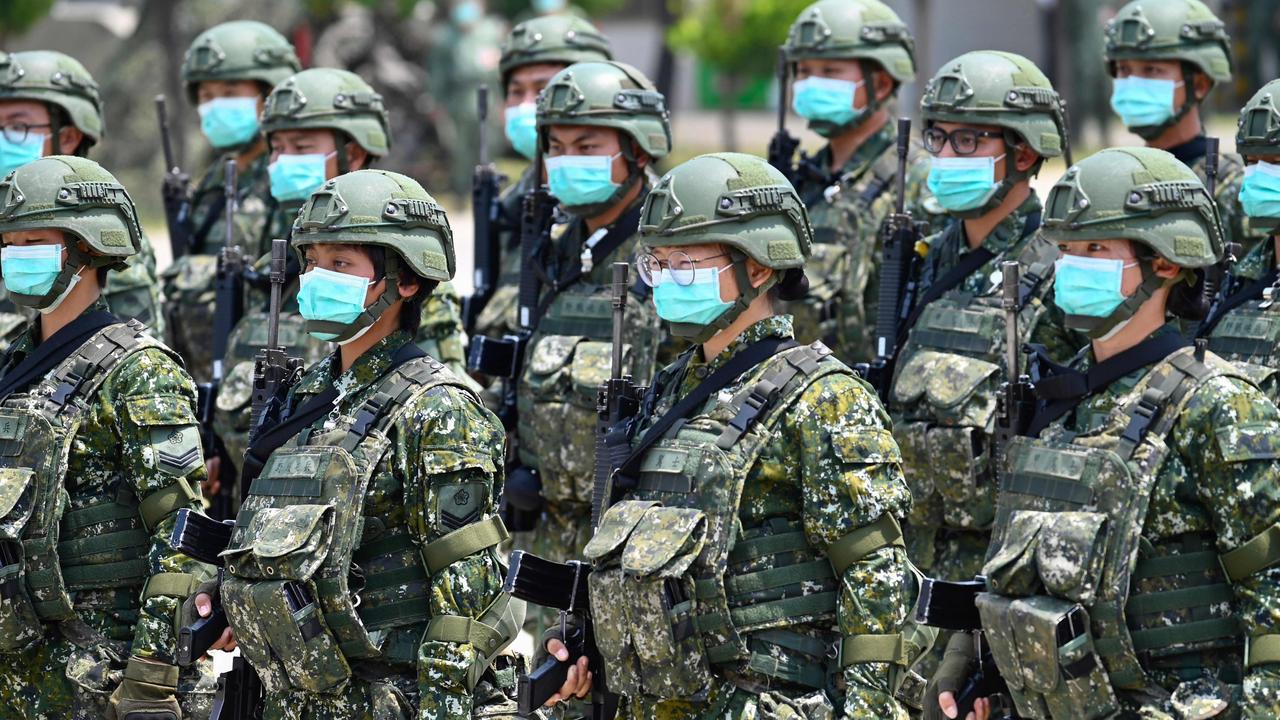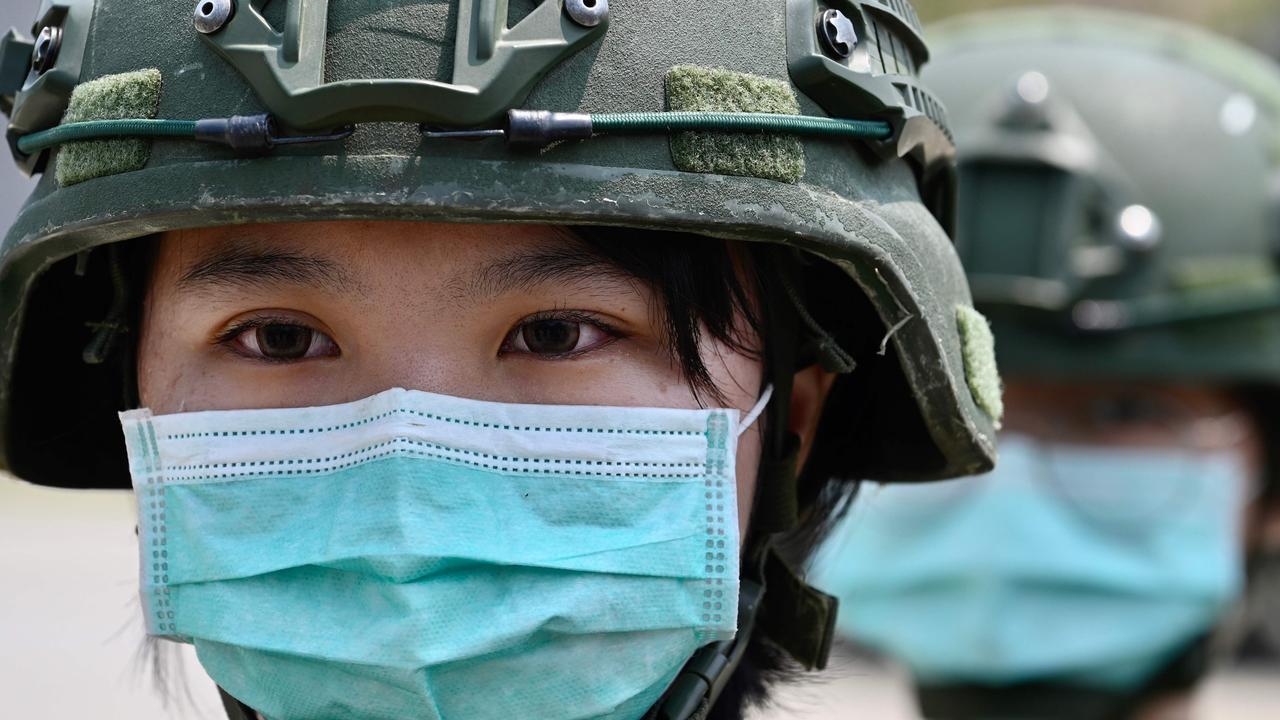China, Taiwan tensions could result in all-out war with the US
It’s the civil “war” that has carried on to this present day. Now it’s getting hot again, fast – and it could boil over into a China-US battle.
There’s unfinished business between China and Taiwan.
It tossed out its emperor. Japan invaded. Then a brutal civil war tore the nation in half. That war never ended. Now it threatens to get hot again, fast.
The prospect featured prominently in the Pentagon’s annual report: Years of increasing tension across the Taiwan Strait appear to be coming to a head.
Taiwan’s shores are the target of upscaled, intimidatingly regular military exercises by Beijing. Pressure on international forums to ignore Taipei has escalated dramatically. And the fate of Hong Kong has shattered hopes of a peaceful compromise.
“The Chinese civil war has never ended – it has just shifted means, modes and tempo, and the ‘war’ has continued to the present day,” retired CIA analyst John Culver writes for the Lowy Institute. “(That) unfinished Chinese civil war will re-emerge as not only a military contest. And it’s likely that, from the moment the shooting starts, it will cease being the unfinished Chinese civil war and will become the China-US war.”
RELATED: ‘War will come’: China’s shock new threat

Just how real is the threat?
“We may soon find out,” says Brookings Institution foreign policy analyst Robert Kagan. “There has never been any mystery about what Chinese President Xi Jinping wants because it is what Beijing has wanted for decades: to make the Chinese nation whole again, to subdue opposition in Xinjiang and Tibet, to control the South China Sea and certain strategically located islands in the East China Sea, to regain Hong Kong … and to ‘reunite’ Taiwan with the mainland under the Chinese Communist Party’s rule.”
UNCIVIL RELATIONS
The world has changed.
The optimism generated by the collapse of the Soviet Union has long since evaporated.
China has overcome its fear of being economically isolated from the rest of the world.
The United States is tired of its self-proclaimed role a being a bulwark of democracy and freedom.
Now, 75 years of international order is being torn apart. And Taiwan is on the fault line.
“The Chinese have hoped to accomplish their objectives largely by using their growing economic clout,” says Mr Kagan. “Until recently, they were fairly successful.”
The world was keen to piggyback China’s economic growth.
It hoped Beijing would ‘see the light’ and steadily conform with the standards, rules and expectations of the international community.
But a cascade of crises has put an end to that dream.
“Many of the understandings, military factors and ambiguous positions that enabled decades of peace, prosperity and democracy on Taiwan are now eroding,” Mr Culver writes. “(This is) due to China’s burgeoning economic and military power, Taiwan’s consolidating democracy led by the pro-autonomy DPP (Democratic Progressive Party), and burgeoning US determination to play the ‘Taiwan card’ in its strategic rivalry with China.”
RELATED: China and US in battle for supremacy

And Beijing’s relationship with the established world order has broken down.
“The liberal capitalist world has become steadily less enthralled by the money to be made in China and more concerned about Chinese economic competition,” Mr Kagan notes. “That has raised important questions for Xi and his colleagues. If the peaceful, economic route to their goals is closing, is it time to shift to more forceful means? Is it time to start making use of the military capacity they have spent more than two decades and hundreds of billions of dollars building?
“Taiwan is likely to be the place where these questions are answered.”
GREAT POWERS
Hong Kong has ‘fallen’. The East and South China Seas are on the brink of becoming Beijing’s private lakes. India, Nepal and Borneo are contemplating borders redrawn in China’s favour.
“What is happening today is exactly what was predicted and exactly what Chinese leaders intended,” Mr Kagan argues. “Our outrage, while appropriate, is also embarrassing.”
Beijing is exercising its new-found boldness.
And it has the military, technology and economy to back it up.
“That Xi has now decided to end the Hong Kong charade once and for all has ominous implications for Taiwan,” Mr Kagan writes. “China can launch devastating missile strikes against Taiwan in the first 24 hours of a conflict, leaving Taipei a choice between surrendering and holding out to see whether the Americans will arrive in time to prevent total annihilation.”
RELATED: China’s most aggressive move yet

But Mr Culver isn’t convinced war is Beijing’s only option.
“Tellingly, China’s 2005 law laying a foundation for the use of force is an ‘anti-secession’ law, not a ‘reunification law’,” he argues.
He sees it as a carefully crafted distinction that aims to preserve the status quo: An independent Taiwan that is isolated from the world community. And it allows Xi to continue his campaign to recast the US as the ‘world’s bully’ instead of the ‘world’s police officer’.
“Rather than being the ‘security guarantor of the Western Pacific’, China will seek to make the US the ‘insecurity guarantor’ disrupting the region’s (and the world’s) trade, prosperity and peace, and to create doubt and gaps between the US and its allies and partners,” Mr Culver writes.
That’s not to say continued crises aren’t likely.
“(Beijing) can seek the right time and conditions to demonstrate to the people of Taiwan – and Japan, Australia and the US – that the US military cannot prevent or undo China’s actions, and either will not put its major military assets into harm’s way, or having done so, will suffer surprising and politically devastating losses.”
THE DOGS OF WAR
Whatever form it takes, if a war were to break out, it would be immensely costly, both in human and economic terms.
“The region that has driven global economic growth for the past several decades would become a war zone, breaking global supply chains, transportation links and financial systems,” Mr Culver warns. “Taiwan would be the first battlefield of intensive combat operations between the world’s two most powerful military forces in a war that would quickly cease to be primarily about Taiwan’s autonomy, prosperity or the lives and livelihoods of its 24 million people.”
RELATED: Standoff after China accused of bold move

The implications of war are deep and profound.
“For the CCP, such a conflict would be about its legitimacy and survival, and the return of China as the dominant power in East Asia. Not contesting probably would not be an option for the CCP,” Mr Culver notes.
“For Washington, it would present a Hobbesian choice: Intervene in open-ended, financially ruinous conflict with another nuclear power for the first time and risk unprecedented combat losses, or be seen as standing aside in the face of an assault on a vibrant democracy and its 24 million citizens.”
Mr Kagan, however, believes the temptation for Xi to stamp his will on the world is enormous.
“A China in possession of Taiwan would be poised to dominate East Asia and the western Pacific as never before, scrambling the entire global strategic equation,” he says. “This would be a historic accomplishment for Xi, but there are also huge risks. Trying to take Taiwan and failing would be catastrophic, both to Xi personally and possibly to the regime itself.”
TIME WILL TELL
Decades of diplomatic dithering is culminating in crisis.
Following World War II, Washington was keen to stem the rising tide of communism. It took the fight to Korea and Vietnam. It battled to a standstill in Korea. It lost Vietnam.
It was equally keen to contain Communist China. But the alternative wasn’t that great, either.
“The US decision not to support unpopular, deeply corrupt KMT leader Chiang Kai-shek – a Second World War ally – in his fight on the mainland hastened the CCP’s victory there,” Mr Culver writes.
This decision set the scene for a political quagmire.
The US still argues it has no official position on the unity of China. It just wants the two sides to sort out their differences peacefully. And it’s prepared to defend Taiwan’s right to do so.
Thus was born the idea of “One Nation, Two Systems”.
It got that way because Washington sent the Seventh Fleet into the Taiwan Strait during the Korean War. This blocked Communist China from invading the last nationalist enclave.
Ever since, China and Taiwan have been nervously watching each other over an informal “Medial Line” of control down the centre of the Taiwan Strait.
“For the past 40 years, in part because of the US commitment neither to support Taiwan independence nor to abandon its former ally, China shifted priorities for its war with Taiwan to building cross-strait relations,” Mr Culver says.

Taiwan’s nationalist dictatorship crumbled in 1987. Chiang’s son had a different outlook to his father. He wanted a healthy, modern economy for his nation. And that, he realised, would only flourish with the lifting of martial law and the eradication of corruption.
So he started the island nation down the path of democracy.
Communism didn’t start out all that well for China. Hunger. Political purges. Oppression. Isolation. All constrained the nation until it adopted a policy of “opening up” to the world in the 1990s. Now, self-appointed Communist Party “Core Leader” and Chairman-for-life Xi Jinping, riding high on this economic success, is seeking to impose his version of “Chinese characteristics” on both his empire and the world.
And he’s made Taiwan a personal challenge.
“For China, its adversaries’ centre of gravity isn’t their purely military capacity to blunt an invasion. Instead, it’s the will of the Taiwan people and military to fight, and the will and capacity of the US to intervene,” Mr Culver says.
Jamie Seidel is a freelance writer | @JamieSeidel




